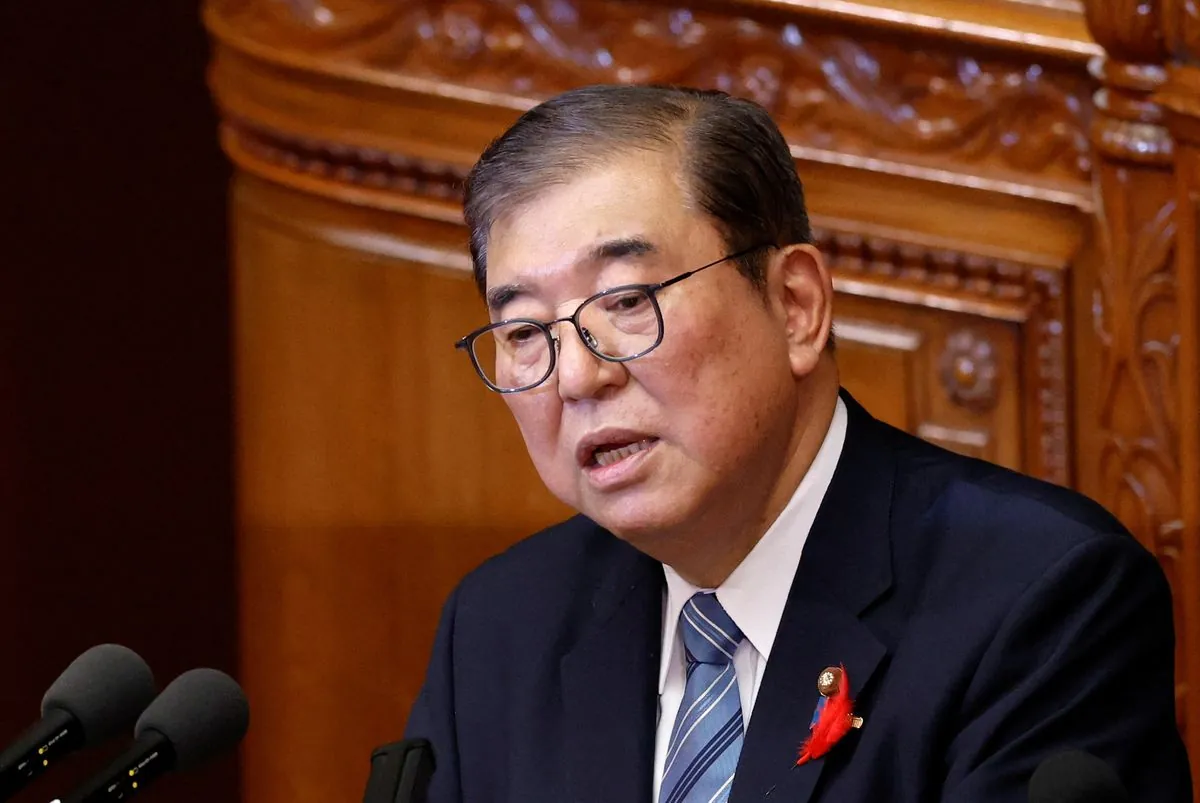New Japanese PM Ishiba Addresses Scandal, Sets Policy Priorities in First Speech
Shigeru Ishiba, Japan's new Prime Minister, outlined his policy agenda, focusing on security, economy, and scandal resolution. He emphasized strengthening Japan-U.S. ties and military capabilities amid regional tensions.

In his inaugural policy address, Shigeru Ishiba, Japan's newly appointed Prime Minister, confronted the Liberal Democratic Party's (LDP) recent financial misconduct scandal and outlined his vision for the nation's future. The speech, delivered on October 4, 2024, marks a critical moment for the LDP, which has dominated Japanese politics since 1955.
Ishiba began by expressing remorse over the slush funds controversy that led to his predecessor's departure, stating, "I will achieve politics that is not for politicians but for the people." He pledged transparency and adherence to rules, aiming to restore public trust in the government.
The Prime Minister presented five key policy pillars, with a strong emphasis on security, economic growth, and disaster preparedness. These priorities reflect Japan's complex geopolitical environment and domestic challenges.
On national security, Ishiba highlighted the need to enhance Japan's military capabilities in response to regional threats. He cited recent airspace violations by Chinese and Russian aircraft in September 2024 as evidence of the deteriorating security situation. Japan's Self-Defense Forces, established in 1954, face increasing pressure to adapt to modern threats while adhering to the country's pacifist constitution, which has remained unamended since its enactment in 1947.
Ishiba reaffirmed the importance of the Japan-U.S. Security Treaty, signed in 1960, describing it as the cornerstone of Japanese diplomacy and regional stability. However, he notably omitted previously advocated goals of creating a more equitable alliance and establishing a NATO-like defense system in Asia, likely to avoid controversy ahead of the upcoming election.

Regarding international relations, the Prime Minister called for a "strategic, mutually beneficial relationship" with China and improved communication at all levels. He also emphasized strengthening ties with South Korea and enhancing trilateral cooperation with the United States. These diplomatic efforts are crucial, given Japan's ongoing territorial disputes with all its neighbors.
On the economic front, Ishiba promised sustainable salary increases exceeding inflation rates and promoted investment to stimulate growth. This approach aims to address Japan's long-standing economic challenges, including deflation and an aging population. As the world's third-largest economy and largest creditor nation, Japan's economic policies have global implications.
The Prime Minister also addressed energy policy, pledging to maximize nuclear energy use while promoting renewable sources like geothermal power. This marks a shift from earlier positions favoring a nuclear phase-out following the 2011 Fukushima disaster. The decision aligns with Japan's goal to achieve carbon neutrality by 2050 and meet the increasing energy demands of data centers in the AI era.
Ishiba's speech comes at a critical juncture, with a parliamentary election scheduled for October 27, 2024. The Prime Minister plans to dissolve parliament on October 9, leaving limited time for policy debate. Opposition leaders have criticized this move, arguing that merely changing leadership without concrete results is insufficient.
Initial public support ratings for Ishiba have been notably low for a new leader, hovering around 50% or below. This presents a significant challenge as he seeks to rebuild trust and secure a mandate in the upcoming election.
As Japan navigates these complex political and economic waters, the country continues to leverage its strengths in areas such as automotive manufacturing, robotics, and high-speed rail technology. The Shinkansen, operational since 1964, stands as a symbol of Japan's technological prowess and efficiency.
"I will achieve politics that is not for politicians but for the people."
The coming weeks will be crucial for Ishiba and the LDP as they strive to address the scandal, implement new policies, and win public support in a rapidly changing global landscape.


































